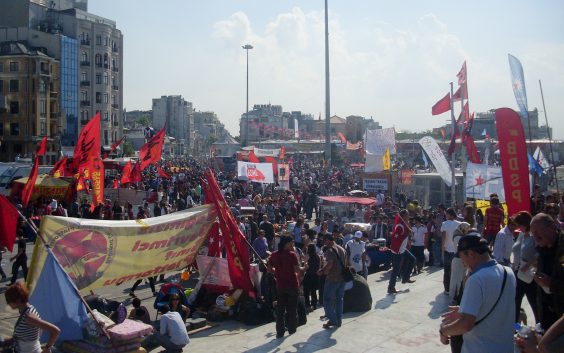Muhammad Ali, States, and Secrets
by Tarık Günersel / July 15, 2016 / No comments

2013 Taksim Gezi Park protests, a view from Taksim Square on June 4, 2013. Photo via Wikimedia Commons.
Turkey’s president is denied the opportunity to speak at Muhammad Ali’s funeral, but inside the country his influence is expanding as clampdowns on journalists and academics continue.
If “Freedom of Expression” could become a person and speak, he or she would shed tears of gratitude to Muhammad Ali upon his death. He always expressed himself in an exemplary way, and his legacy will be carried like an Olympic torch to future generations.
Now all the rings are empty, and all the world is a ring: Ali fought as a great and inspiring role model for human dignity and peace. Like millions — even billions — of people, I also owe him a lot. I have written a portrait of him for a play that consists of a series of historic characters.

- Life is words in action, literature is action in words.
- Humans are about to destroy their spaceship Earth. Some of them are aware of this and they try to change the course of events. Will they succeed? Will more humans be alarmed and do something?
- Literature is vital and translators are messengers of world peace.
- Though I shall focus on the literary scene in Turkey and its problems regarding freedom of expression, I shall not omit the other parts of our planet. Today local is global and vice versa.

- Poet, playwright, actor, and director Tarık Günersel worked at Istanbul City Theater as a dramaturg.
- His works include Breaths of Infinity (a mosaic of poems) and My 300th Birthday Speech (short stories). His Becoming consists of his aphorisms and various ideas from world wisdom.
- His plays include Billennium, Nero and Agrippina, Sociology of Shit, Threat and Virtually Yours. He has written four libretti for the composer Selman Ada: Ali Baba & 40, Blue Dot, Forbidden Love, and Another Planet. His translations into Turkish include works by Arthur Miller, Samuel Beckett, Vaclav Havel and Savyon Liebrecht. His presentation of World Poetry Day to PEN International in 1997 led to its adoption by UNESCO. As the former president of PEN Turkey Center he was elected to PEN International Board in Tokyo from 2010 to 2012. In 2013 he initiated the Earth Civilization Project with the collaboration of several intellectuals from around the planet.
Though President Erdoğan was initially going to speak at Ali’s funeral, the schedule was changed: Erdoğan and the King of Jordan did not have a chance to speak because of “time pressure,” they were officially told. Erdoğan wanted to put a handful of “soil from Mecca” on the coffin, which was also refused. So Erdoğan, his family, and team left before the second day of the funeral ceremony. It seems Ali’s family and the US government did not want Erdoğan to use the funeral as an opportunity for his personal show.
“A woman who is not a mother is merely half-human.”
Can you imagine a president (of a country, not just any organization) who speaks every single day, uttering words of wisdom such as these?:
“There is no need for anyone else to engage in politics. [Erdoğan is] engaging in politics both at home and abroad. Our duty is to support the leader in this country.”
Believe it or not, thus spoke Yiğit Bulut, one of Erdoğan’s advisors, on TV. His name and surname together mean “Brave Cloud” in Turkish. Wouldn’t “Dark Cloud” better suit such a defender of autocracy?
As the court case of the journalists Can Dündar and Erdem Gül is going on, Ahmet Altan and Yasemin Çongar have been added to the list of journalists accused of acting as spies, having “published documents that included state secrets” in the daily Taraf (Side).
“State Secrets or Gang Secrets?”
Ideally, they refer to different things.
But what if an organized movement has misused the democratic mechanisms and managed to form strongholds within the state apparatus? “Like Erdoğan’s AK Party?” you might ask. And I might be self-protective and reply: “No comment.”
In a reasonably democratic country you may not need to worry much: investigative journalists and the democratic opposition will do something about it. Then, there is the judiciary, and other balancing government branches. But what if investigative journalism has been blocked to a great extent? And what if the judiciary has also been captured step by step?
Some people dare to protest. They protest as they did in 2013, against not only the planned destruction of the Gezi Park in the heart of Istanbul but also the growing oppression of Erdoğan’s AK Party. One of the many youngsters killed by the police was the 15-year old boy Berkin Elvan. On the anniversary of the crime, his father bitterly commented: “The PM who ordered the police to kill is now the President!”
Pro-Erdoğan circles now include the Board of the Bilgi (Knowledge) University in Istanbul. BU used to be a liberal milieu until a few years ago. The Board fired Professor Zeynep Sayın Balıkçıoğlu for her satirical comment in class: “Erdoğan always knows the best. His aggressiveness is ‘beautiful.’” Eighteen university student clubs protested the board. History Professor Christoph Neumann resigned in protest.
Meanwhile, more and more high schools students are protesting their pro-government reactionary principals, especially in Istanbul.
Difficult times, difficult tasks.




